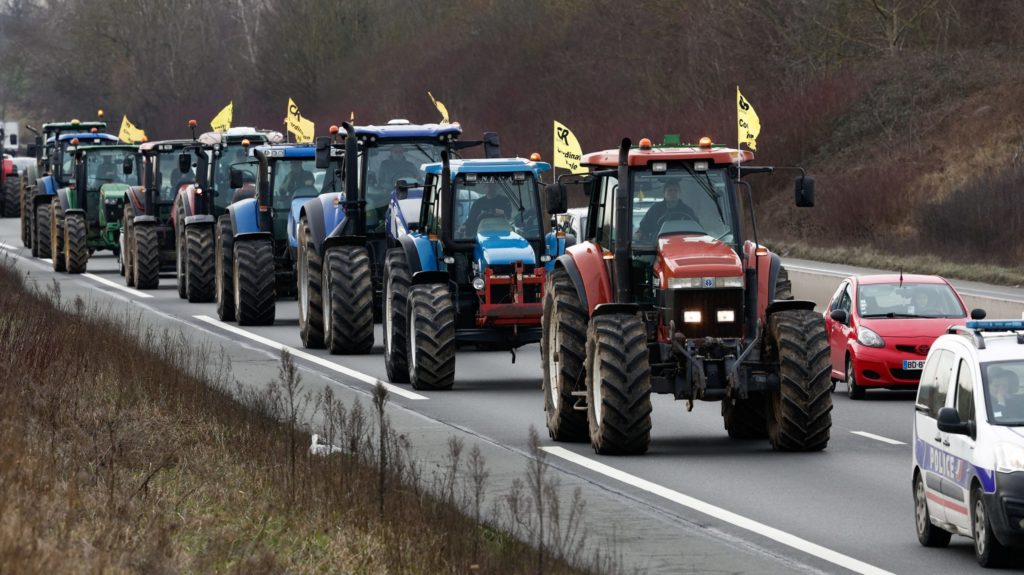Several of France’s Catholic leaders have expressed solidarity with the country’s agricultural workers amid historic protests that have seen farmers block major roadways near Paris with their tractors to protest environmental regulations, taxes, and competition from cheap imports.
In a Jan. 24 statement, Bishop Jean-Marc Micas of the Diocese of Tarbes-et-Lourdes, which is a largely rural diocese that includes the world-famous Marian shrine of Lourdes, said he wants to “express all my support to the farmers of the diocese.” He encouraged all the diocese’s parishes and religious communities to pray for those involved in the protest.
“The farmers, we know, are responsible people, sensitive to issues related to climate and the environment. They keenly feel their daily life has become very unfair and difficult,” the bishop wrote.
Bishop Philippe Christory of Chartres, a lowland region some 60 miles from Paris and a major economic area in French agricultural production, expressed “the Catholic Church’s compassion for all those who devote their lives to working the land and raising animals to feed us,” as reported by OSV News.
“Our visits to farms and agricultural businesses give us an insight into the day-to-day efforts of everyone involved. We would like to thank the farmers who commit themselves unreservedly to this demanding profession, where they do not count the hours, where they face unpredictable weather conditions, where they have no control over selling prices. We understand how difficult their daily lives are and the anxiety that often grips them.”
The bishop of Bordeaux — a world-famous wine-producing region — said in a Jan. 22 statement that “in the Catholic Church, I want to encourage solidarity and exchange with people in difficulty.”
“Some winegrowers remain silent about their situation, are ashamed of it, and end up despairing. However, they carry great human wealth and experience. Their lives are valuable to us! We have to encourage bonds of listening, friendship, and support. I thank the parishes and movements affected by this crisis, for taking the initiative of meetings to exchange, to develop fraternity … in addition to financial or social procedures, people worried about their future need to be welcomed.”
Other Catholic leaders, including the bishops of Brittany, added fishermen to their statement. They denounced unfair competition from “production from abroad where environmental standards are not binding, or even do not exist,” OSV News said.
A video posted online even shows a priest blessing the farmers’ tractors as they pass by.
FRANCE
Priest blesses farmers in tractors taking part in large scale protests as they travel through Bergerac #AgriculteursEnColere pic.twitter.com/khGLHqgiBA
— Catholic Arena (@CatholicArena) January 29, 2024
What are the protests all about?
Falling food prices, high taxes, increased foreign competition, demographic factors, environmental regulations, and unforeseen circumstances such as recent adverse weather conditions have tightened pressures on the country’s shrinking agricultural workforce. The price of wheat, buoyed by high Russian exports, slumped to 214 euros ($233) per ton in December 2023, its lowest level in more than two years and less than half its value in May 2022, France24 reported.
A key issue that has emerged for the protestors recently is opposition to a prospective trade deal between the European Union and South American bloc Mercosur, which the protestors worry would increase foreign competition. France’s finance minister, Bruno Le Maire, has said the prospective deal will not be signed in its current form.
Some of the issues in the French agricultural sector are demographic changes that are not unique to France. The workforce in the sector is shrinking; from 2.5 million farmers in France in the 1950s, fewer than half a million remain today, according to France24.
The average age of a French farmer has also increased to 51.4, up from 50.2 in 2010, and France has lost 21% of its farms between 2010 and 2020. In 2020, the rate of suicide among farmers aged 15 to 64 was 43.2% higher than the national average, according to government figures cited by France24.
The prime minister met with officials from the FNSEA farmers’ union, the country’s largest, in Paris on Tuesday evening, France24 reported. Talks among other EU leaders to address the issues are ongoing, as the 2024 Olympic Games, set to begin in six months in Paris, loom large.
Farmer protests have cropped up across the European Union in recent months, including in Italy and Germany. An EU-wide group of Catholic bishops has expressed their support for the protests.
“While we strongly support the goal of a sustainable future for all in the European Union, we share farmers’ concerns about the sustainability of small- and medium-sized businesses and the future of our rural areas,” said the Commission of the Bishops’ Conferences of the European Community (COMECE) on Tuesday.
“The agricultural sector plays an essential role in providing affordable, high-quality food, revitalizing our rural areas, and caring for our landscapes,” the COMECE statement said. “At the same time, statistics show a continuous decline in the number of small- and medium-sized farms, coupled with the risk of farmers aging.”
COMECE called for listening and dialogue as equals to gain “greater recognition for their hard work,” “an understanding of their concerns, and, above all, an appreciation for those who feed us.”

